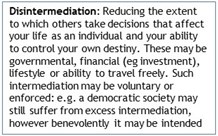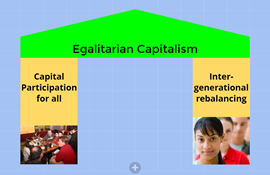Participation for all: why it matters, what it means
As humanity edges still closer to a state of general conflict from which it could be very difficult to extract ourselves, we should be looking closely at what lies at the heart of all these outbreaks of violence. Is it really cultural differences and styles of governance, or is there something even more fundamental — huge disparities in wealth?
In our commentaries over the past six years, we have frequently drawn attention to huge regional variances in wealth, and both in Russia and among Palestinian refugees it has been a major factor in driving conflict. The Credit Suisse Global Wealth Report is a good source of information about wealth inequality within both regions and individual countries.
In order to achieve a world at peace with itself, we must make steady progress towards participation for all. It's for this reason that Share Alliance, which received confirmation of charity registration earlier this month, has adopted the phrase ‘participation for all’ to communicate its purpose.
So, this week we’ll provide an update on the progress that has been achieved by both Share Alliance, including its Cambridge-based research programme, and The Share Foundation, over the past year.
The key difference between Share Alliance and The Share Foundation is in their beneficiaries. The objectives of Share Alliance have no limits as to global reach and age, whereas The Share Foundation is focused on disadvantaged young people in the United Kingdom. The Share Foundation is also heavily committed to delivery and, in doing so, it enables the provision of starter capital accounts and life skills development for young people in care on behalf of the Department for Education. In contrast, Share Alliance is undertaking a journey of research, education and advocacy at this stage of its journey towards implementation.
 However, at the heart of both charities there is a single pair of underlying principles: the first being a deep respect for others from all backgrounds and however different they may be, and the second, a strong commitment to disintermediation — individual freedom and self-control in all respects (provided, of course, that it reflects that essential respect for others and their interests).
However, at the heart of both charities there is a single pair of underlying principles: the first being a deep respect for others from all backgrounds and however different they may be, and the second, a strong commitment to disintermediation — individual freedom and self-control in all respects (provided, of course, that it reflects that essential respect for others and their interests).
 ‘Participation for All’ has two pillars, or strands, for development: inter-generational rebalancing, focused on young people, and enabling people of all ages to share in wealth creation as the route forward for adults. Both of these strands feature strongly in Share Radios commentaries, as listeners will be aware.
‘Participation for All’ has two pillars, or strands, for development: inter-generational rebalancing, focused on young people, and enabling people of all ages to share in wealth creation as the route forward for adults. Both of these strands feature strongly in Share Radios commentaries, as listeners will be aware.
Inter-generational rebalancing has seen a huge step forward over the past year with the concept of incentivised learning. Assisted by a donation of over £400,000 from the British Bankers’ Association, The Share Foundation has opened its Stepladder Plus programme for all 15-17 year-olds in care across the United Kingdom. Nearly 900 adolescents have stepped forward to register, and those who have started the programme are achieving an average of just under four steps out of the six available, earning on average of £786 out of the maximum £1,500. Their attitudinal transformation is clearly evident in Step 4 testimonials.
This major expansion is not only giving these young people a much-improved start to adult life, but it is also providing a strong quantitative basis for the research underway at Cambridge. A major business case has also been prepared by Mutual Ventures, a social investment specialist consultancy. These initiatives provide strong arguments for hypothecating inheritance tax proceeds, and for philanthropic appeals such as the current advertisement in the Oldie magazine.
Meanwhile, work is underway to establish an online ‘Introduction to the Performing Arts’ course for young people in care who find the Stepladder Plus programme too academically challenging.
Our work to enable adults to share in wealth creation is focused on ‘Stock for Data’, the route by which we can use the catalyst of data harvesting and generative AI as a basis for equity ownership. It’s hard to overstate the significance of this initiative, which could offer humanity a way of sharing ownership of, and taking a share in responsibility for, wealth-creating technology, rather than only having welfare subservience to look forward to via Universal Basic Income as employment gives way to technological progress.
This research work is being undertaken by Dr. Heloise Greeff, an Oxford-based academic and investor who is working with the King’s College Cambridge research programme. Her work includes how to evaluate and organise participation, how to ensure that distributed governance works effectively for the benefit of both tech giants and their future shareowners thereby achieving a individual sense of responsibility, and how to organise the necessary evolution of regulation and administration. This first stage of research is planned to culminate in an operational pilot in order to test the proposals in practise.
Both of these strands require a long-term perspective: as we commented on 9th May last year, this is not easy to achieve within the short electoral cycles of western democracies. It also looks to a significantly more global perspective for governance.
Nevertheless, a lot of progress has been made over the past year, and there's an increasing sense of momentum for the future.
Gavin Oldham OBE
Share Radio

